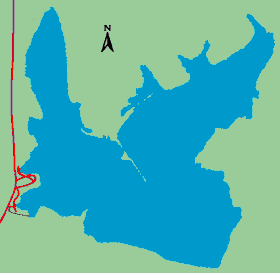Fishing
- Possession and Transport of Exotic Aquatic Species
- Licenses & Regulations
- ShareLunkers
- Fish Identification
- Fish Consumption
- Texas Freshwater Fisheries Center
Water Resources
- Texas Reservoir Levels
- US Army Corps of Engineers
- Texas Water Issues
- Golden Alga
- Aquatic Vegetation
12861 Galm Road #7
San Antonio, Texas 78254
(210) 688-9460 or 688-9516
Mitch Nisbet, Biologist
Local Information
- Visit San Antonio
203 S. St. Mary's St., 2nd floor
San Antonio, Texas 78205
(800) 447-3372
(210) 207-6700
Braunig Lake
Quick Links: Fishing Regulations | Angling Opportunities | Cover & Structure | Tips & Tactics
Braunig Lake is open and has some new rules for visitors. Get the details.
Lake Characteristics
Location: In the San Antonio River watershed
on Calaveras and Chupaderas creeks, 17 miles south of San Antonio
on Highway 37 in Bexar County
Surface area: 1,350 acres
Maximum depth: 50 feet
Impounded: 1964
Water Conditions
Conservation Pool Elevation: summer 506.5 ft., winter 505.5 ft. msl
Fluctuation: 1-2 feet
Normal Clarity: Stained with visibility
of 1-2 feet
Camping & Recreational Facilities
(210) 632-4128
Reservoir Controlling Authority
CPS Energy
PO Box 1771
San Antonio, Texas 78292
(210) 632-4128
Aquatic Vegetation
Primarily bulrush and cattails along shoreline
Predominant Fish Species
- Red drum
- Hybrid striped bass
- Channel & blue catfish
- Largemouth bass
Lake Records
Current
Fishing Report
Stocking History
Latest Survey Report
Lake Maps
Provided at entrance point
Fishing Regulations
This reservoir has a special regulation on red drum. See bag and size limits.
Angling Opportunities
Red drum are the most popular sport fish in the reservoir. Hybrid striped bass and catfish are the next most sought after species. Although quality to trophy size largemouth bass are present, a limited fishery currently exists.
| Species | Poor | Fair | Good | Excellent |
|---|---|---|---|---|
| Largemouth Bass | ||||
| Catfish | ||||
| Hybrid Striped Bass | ||||
| Red Drum |
Fishing Cover/Structure
The main cover is provided by bulrush and cattails along the shoreline and the main structure found at Braunig consists of rock rip-rap along the dam and peninsulas.
Tips & Tactics
Red drum fishing is good March through August with many fish
in excess of 20 pounds harvested annually. As on the coast, this schooling
species
may sometimes
be located by watching for feeding activities by seagulls or pelicans. In winter,
red drum may be found near the heated discharges. Crawfish and tilapia are
very good natural baits; good artificial lures include
spoons (gold and silver), rattle traps and trolled deep-diving crankbaits..
Hybrid striped bass fishing is good from January through
August, and peaks in spring. Again, watch for birds' feeding activities.
As with red drum during the winter months, hybrids may be found in
the heated discharge areas.
Chicken liver has proven to be a very good natural bait; spoons
and rattle traps are effective artificial baits. Channel
catfish are
good all year with some of the best fishing occurring in the spring.
Look for cormorant roosts as one possible site to fish. Better
natural baits include cheese baits, liver, shad and cut tilapia. Largemouth
bass fishing is at its best January through April, with the
majority of fish being caught from February on. Carolina rigged plastic
worms,
spinner baits, crank baits and grubs are the most used artificials.
